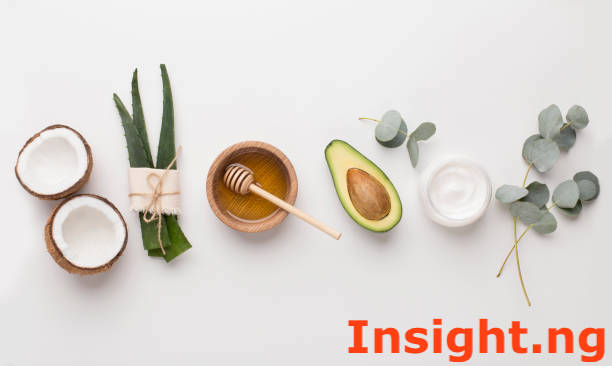Do you know your hair products can contain harmful ingredients to your hair and health?
Some time ago, I had a bad experience using a store-bought leave-in conditioner. I had witnessed this particular product being used in hair salons countless times, unaware of its level of toxins. I purchased it, excited about the soft textured result promised after usage as was printed on the product’s label. I know you are curious about the outcome, I’ll tell you.
While I was detangling the next day, an alarming amount of hair came off with the comb! This went on for days, leaving me with uneven hair length. I could not point out what was happening; of course, I followed the application instructions accurately.
Confused and angry, I stormed right into my search engine and typed in the issue. I still wasn’t satisfied with the search results. As I scrolled down, an article on harmful substances in hair products caught my attention, and I found out how toxic some hair products could be. Right then and there, I vowed to conduct proper research and read reviews as much as possible on a product before purchasing anyone again.
Table of Contents
Why You Should Avoid Store-Bought Hair Products?
Most of these hair products for hair treatments contain harsh chemicals, which over time, damage the hair.
At first, the damaging effect might go unnoticed because you will get overwhelmed by the texture these products leave on your hair.
You, however, realize too late the attractive side is short-lived, and your hair suffers a loss, breakage, dandruff, and abnormalities such as cancer, dry and itchy scalp; skin, lungs, and eye irritations; you might develop allergies, kidney problems, the inability of your hair to utilizing natural oils or absorb hair oils when applied.
Take, for instance, store-bought shampoos, as this is a very popular product well known to everyone, especially hair keepers. But unfortunately, it has a concentrated amount of toxins.
The main ingredients of some shampoos are; formaldehyde, sulfates, mineral oils, paraben, sodium lauryl, mineral oils, synthetic color and fragrance, dimethicone silicone, alcohol, and a variety of others. Once a shampoo contains these ingredients, it should be avoided. So also other hair products such as deep conditioners, leave-in conditioners, hair wax, and others.
Perhaps you are tired of the amount of toxins in hair products or the high price tag of products with natural ingredients weighing on you. This information will guide boosting and restoring your hair’s overall health and growth.
Let me answer the question in your mind.
Yes, I restored my hair to normal after the bad scenario I had with that leave-in shampoo. I settled for products with natural ingredients.
Although many of these hair products with natural ingredients like; Botanics often come with a high price tag and tend to become scarce. Due to the recession here in Nigeria, as time went on, the price of these products increased drastically and kept on increasing. It came at a time when they were nowhere to be found in stores.
Because of that, I couldn’t afford the products and missed my usual hair care routine for weeks. This left my hair in a messy condition until I came across Jane Aniston’s book ‘HOMEMADE SHAMPOO.’ This book totally changed my perspective on hair products.
My deep interest in natural homemade hair treatments and products grew stronger as I read more books, articles, and blog posts on this topic. In addition, I watched numerous do-it-yourself videos on YouTube and the ones attached to the hair care courses I took on how to utilize raw and plant materials for your hair’s health. So far, I have achieved positive results and am still getting excellent results as I put all I learned into practice.
The difference between store-bought products and homemade hair treatment and products is clear.
While store-bought products can be expensive, and filled with harmful ingredients, in a situation whereby your hair is selective of products and reacts to certain products, you are left with no choice but to stick to a particular brand which brings you to ‘what if’ that brand stops being available or is not available for sometimes. This will lead to a quest for another brand and experiments to check if it is suitable for your hair which will waste your time and expose your hair to another dose of damage if the new brand turns out to be unfit for your hair.
Natural Homemade Hair Treatments and Products
DIY (Do it yourself) natural homemade hair treatments and products are safer and more satisfying, than making your own hair products with materials you already have at home, coupled with the fact that the production process takes no time. They are cheap and readily obtainable. Also, you can decide the combination of recipes best suited for your hair type or to solve a specific hair problem.
All you need to get started is either in your kitchen, around the house, in your garden, from plants around you, or it’s being sold in the local market. Natural ingredients for homemade hair treatment and products consist of:
- Essential oils/carrier oils
- Cooking spices
- Ayurvedic herbs
-
Essential oils
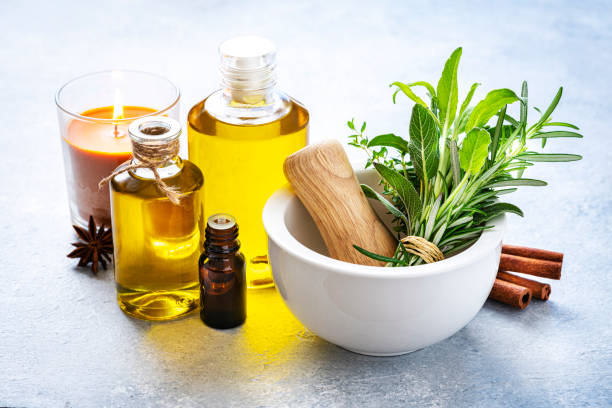
Close up view of a glass massage oil bottle shot on wooden table. Selective focus on the bottle. Cinnamon sticks, dried orange slices and burning candle complete the composition.
What comes to your mind when essential oils are mentioned is that they are placed in a diffuser or candle diffuser to initiate sweet scents. The use of these oils dates far back to medieval times when they were known for their healing properties. Over the years, these oils have been found to have healthy properties for both skin and hair.
These oils are extracted from herbal plants, flowers, and fruits by cold or hot pressing, maceration, steam distillation, double boiling, and a series of other methods.
The efficient and advisable methods are;
- The cold press method involves crushing the original source and applying enough pressure to force out the oil without the use of heat. Hand-operated machines are used.
- Maceration involves the use of carrier oils as solvents for the original source. Here, the plant material is left in a covered container with a carrier oil for at least five days for remedial properties to be deposited in the carrier oil, then strain out the liquid, press out residue from solid remains, and proceed to filter to get a clear oil.
- The double boiling method is the advanced maceration procedure. After hours or days of the secretion process, the oil in the container is placed in a pot of water and placed on low heat till the oil forms a bubble; proceed to strain and filter. This method ensures the full secretion of the oils’ properties into the carrier oil.
Varieties of these plants are well deposited across the globe, whereas the majority are more densely packed in some provinces than others. They are one of the crucial ingredients for homemade hair treatment known to promote rapid hair, especially when applied as hot oil treatments.
There’s a whole range of essential oils you can dive into. They are easily found in standard stores, an online marketplace like jumia, and hair clinics or saloons though some of these can be expensive and sold in small quantities.
So here, we’d focus on the ones well deposited and can easily be incorporated as DIY homemade hair treatments in Nigeria.
Carrier oil
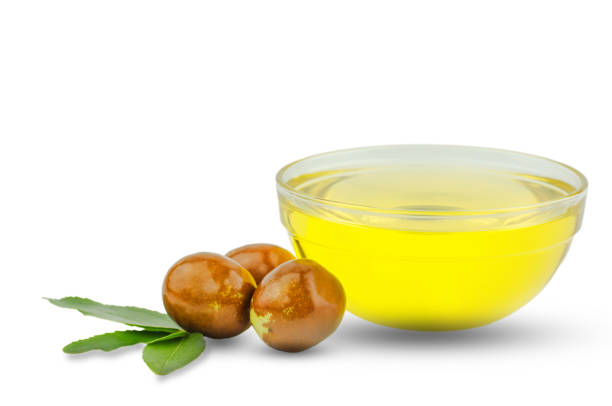
Bowl with Carrier oil and ripe fruits on white background
These oils are vegetable-based oils obtained from seeds or nuts with cold pressing. Although they are used as solvents for essential oils, some essential oils are undeniably strong and potent, which can lead to negative reactions on the skin and hair. Therefore, it is necessary to dilute in a carrier oil before usage. Examples of carrier oils are Coconut oil, castor oil, almond oil, grapeseed oil, olive oil, and others. Unfortunately, few of the essential oils also pass for carrier oils.
Coconut oil as a DIY homemade hair treatment.
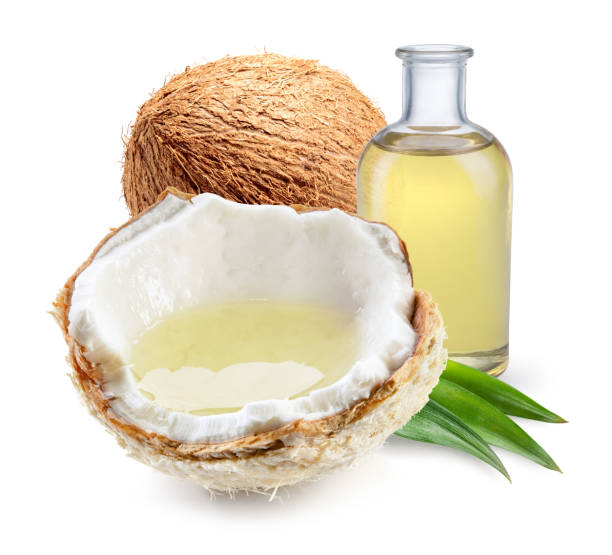
Fresh young coconut with coconut oil
Coconut oil is the most common and readily obtainable oil amongst the other essential oils. It is available in all countries.
The cold press extraction method can extract this oil from the coconut. You can go on YouTube to watch how this can be done. This essential oil works great for every hair type and serves as a moisture sealant.
You can apply this oil and leave it in hair to promote hair growth and help prevent a dry scalp, flakes caused by dandruff, split ends, and hair breakage. It is also used as a carrier oil.
Lemon oil as a DIY homemade hair treatment.
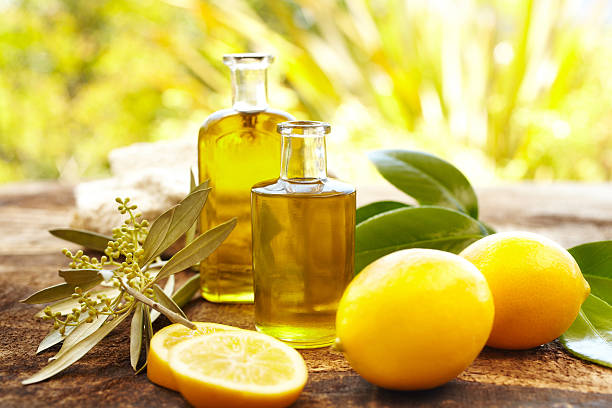
Massage oil bottles at spa outdoors with lemons and green leaves
Lemon oil is extracted from its peels by the double boiling method. Lemon oil can be incorporated into your hair regimen as a scalp massage, it reduces oily scalp, and its antifungal property prevents scalp infection. In addition, its strong antimicrobial properties make it a good cure for dandruff and lice if used in concentrated amounts. However, due to its acidic nature, you have to dilute lemon oil in carrier oils like castor oil or olive oil.
-
Cooking spices

cooking spicies
Amazingly, many spices like turmeric, ginger, cloves, and others used to make and give aroma to meals are beneficial to your hair when applied in the right proportion. Yet, you keep searching for hair products that would improve your hair’s condition; meanwhile, an easy way out is right there within your reach.
Cloves as a DIY homemade hair treatment.
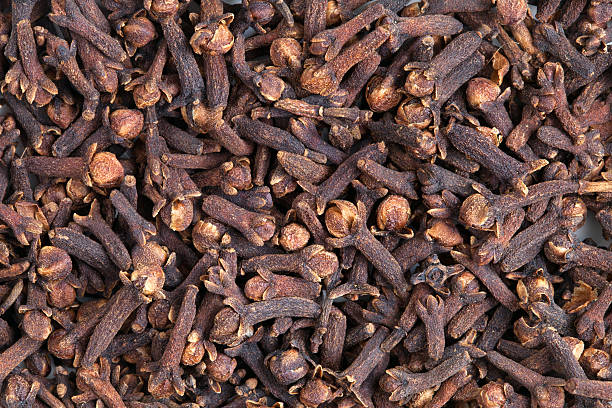
Clove, Used as a spice in cuisines all over the world. The plant is also used in medicine.
This spice can be used either in the form of oil, infused into water, or added to shampoo, conditioner, and hair creams in powdered form. Cloves contain a high level of antioxidant that adds to hair growth. It also contains anti-inflammatory agents, which help hair thicken and protect the scalp from dandruff.
Tumeric as a DIY homemade hair treatment
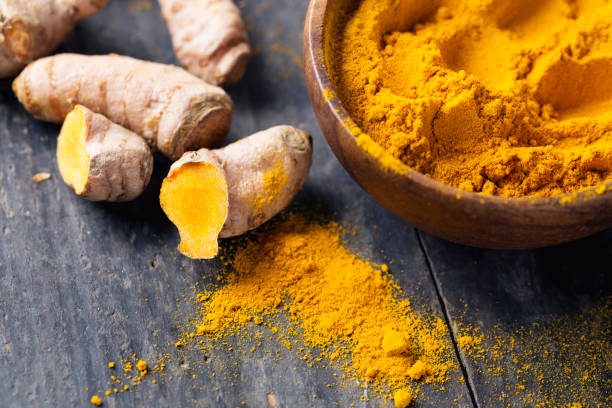
Freh turmeric roots and turmeric powder
Tumeric can also be applied in the form of oil, hair mask, or infused into water, shampoo, and conditioner. However, it can only be left in the hair for some minutes due to its ability to stain surfaces. This spice is a natural exfoliator, fights off dandruff, reduces hair loss, and maintains scalp health. Turmeric is also a natural dye.
For more engaging posts, you can subscribe to our newsletter. If you don’t want that, then follow our Twitter page for more insights.
-
Ayurvedic Herbs
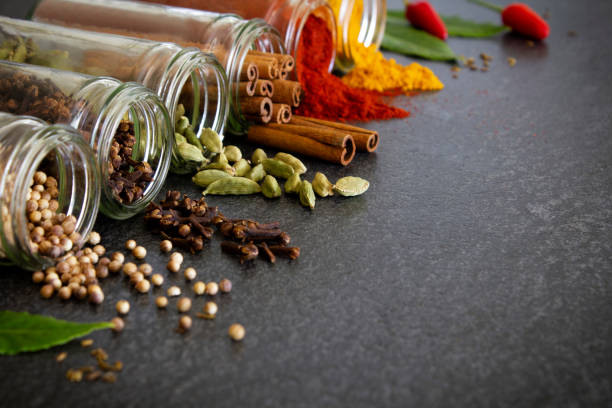
A selection of dried spices and herbs spilling out from glass jars onto a dark slate background.
Ayurvedic herbs are highly effective for restoring hair growth and preventing premature graying. Hair loss is one of the most common problems faced by Nigerian women. Everyone experiences hair fall from time to time. Incorporating one or two of these herbs into your hair regimen nourishes and strengthens it. Plants such as Amla, henna, rosemary, shikakai, Shatavari, and lavender are ayurvedic herbs and grow mostly in Asian countries. You can easily find fenugreek and Aloe vera here in Nigeria and use them as homemade hair treatments.
Fenugreek as a DIY homemade hair treatment

Fenugreek Seeds Spilled from a Spice Jar
This herb is used as a hair rinse, oil, and mask. It contains amino acids, iron, magnesium, and manganese, which are crucial to the hair. In addition, it allows the regeneration of dormant hair follicles. Twenty percent intake of fenugreek daily will help you recover hair loss caused by stress and deficient diets.
Aloe vera as a DIY homemade hair treatment
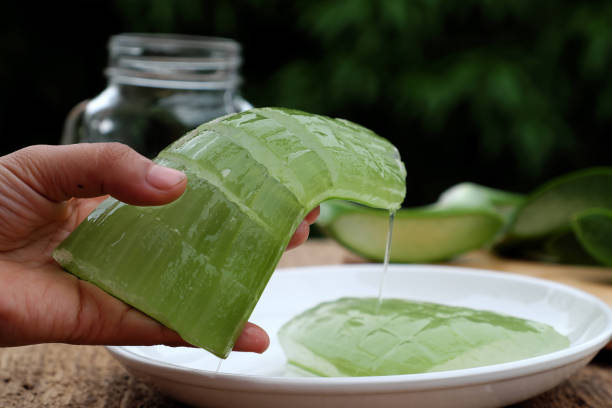
Woman hand hold aloe vera leaf with gel, a kind of herbal medicine with many use in health care, also organic cosmetic, skin care.
Aloe vera is a very potent antioxidant and antimicrobial agent; introducing it into your hair care routine as a pre-pooing hair mask either as juice, gel, or paste-forming powder adds shine to your hair, maintains the flexibility of your hair, and contains enzymes that revive hibernated hair follicles and also balance the pH level of your hair.
Conclusion
You can easily experiment and combine one or two constituents of these ingredients to get your own unique chemical-free homemade hair products that will be as efficient as your hair treatments.
With further research and regular practice, you’d be as good as commercializing your homemade products to benefit people who have no idea of the bad effects of chemical products on their hair. The examples given under main ingredients for homemade hair treatment are few out of many.
Did you learn something new? Feel free to use the comment section, and you can alsojoin our Whatsapp community for firsthand updates on haircare and other insightful information.
About the Author
Lawal Jesutofunmi Mary is a Skin care expert, hair care consultant and content writer communicating helpful information on hair and skin care through writing. I am a bibliophile who loves to broaden her horizons through reading. Writing reviews of books on personal growth and self development gives me joy.
About Author
- Lawal Jesutofunmi Mary is a Skin care expert, hair care consultant and content writer communicating helpful information on hair and skin care through writing. She is an avid reader who loves to broaden her horizons through reading. Writing reviews of books on personal growth and self development gives her joy.

